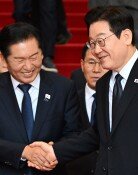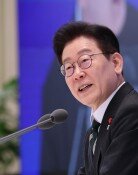Job Quota for Meritorious Persons Falls Short of Goals
Job Quota for Meritorious Persons Falls Short of Goals
Posted June. 18, 2009 08:14,
The governments job quota system for persons cited for national merit, independence fighters and their relatives is under fire due to poor implementation.
Major public agencies such as the National Assembly and courts have largely failed to properly follow the system but have faced no punitive measures.
The Act for Honorable Treatment of National Meritorious Persons and the Act for Honorable Treatment of Contributors to National Democratization stipulate that state-run organizations should set quotas to hire such persons and their relatives.
○ Ignored by powerful organizations
Materials handed to ruling Grand National Party lawmaker Park Jong-hee by the Patriots and Veterans Affairs Ministry yesterday said most major public agencies have not implemented the hiring system.
Under law, governmental agencies must help persons cited for national merit land jobs. More than 10 percent of each entitys workforce must be filled by such persons or their relatives.
As of late May, however, 85 public organizations had hired only 6,710 persons of merit, or 53 percent of the legal requirement of 12,656. Worse, persons of merit accounted for only 11.7 percent of the workforce in lower courts, followed by the Seoul city government (17 percent); the Supreme Court (18.8 percent); National Assembly Secretariat (19.4 percent); higher courts (20 percent); and the Strategy and Finance Ministry (20.7 percent).
The Knowledge Economy Ministry and its affiliates, which have a combined 21,221 technical officials, should hire 2,115 meritorious persons or their relatives but have taken in just 438 (20.7 percent of the legal requirement). Similarly, the Seoul city government and its subsidiaries have a combined 10,207 technical officials and are required to hire 1,011 persons of merit or their relatives, but have hired only 172.
The employment rate of such persons or their relatives at major governmental agencies was below 53 percent, the average for all public offices. The rates included 30.6 percent at the National Election Commission; 33.3 at the National Assembly Library; 36.4 percent at the presidential office of Cheong Wa Dae; 37.2 percent at the National Tax Service; 37.2 percent at the National Police Agency; 42.9 percent at the Constitutional Court; and 44.6 percent at the Supreme Prosecutors Office.
By organization type, public schools had the highest rate of 89 percent, followed by autonomous organizations for educational purposes at 77 percent; central administrative organizations 45.1 percent; provincial and municipal governments 42.5 percent; other governmental agencies such as the Constitutional Court and the National Election Commission 32.6 percent; the legislature 21.4 percent; and the judiciary 13.2 percent.
○ Improvement needed
Experts say the government needs to better enforce the quota. The rule is that a company with more than 200 workers must fill three to eight percent of its workforce with people of merit.
The nations 1,856 state-run corporations have hired 22,577 such people, or 89.8 percent of the legal requirement of 25,137. On the other hand, 13,885 private companies are required to hire 119,365 meritorious people but have taken in just 43,196 or 36.2 percent of the legal requirement.
Corporations, however, say the mandatory quota system violates their right to conduct personnel management. A worker at a private company said, The figure is too high to follow. Worker recruitment can be understood as a right of management. Its also hard sometimes to find the right candidates for jobs among meritorious people.
Another source added, Personnel management staff try to curry favor with workers at the Patriots and Veterans Affairs Ministry. They have no choice but appeal to the ministry to avoid fines.
A ministry official said, however, Weve fined companies only 22 times over the past four years for violations. The employment rate of meritorious people or their relatives is low since they dont want to work at small and medium-size companies or unattractive workplaces.
Lawmaker Park said, The system is designed to help national meritorious people and their relatives, but has some problems. Certainly, no measures punish governmental agencies that snub the rules. Well consider measures to revise relevant laws.
constant25@donga.com







